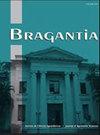亚热带气候下梨叶芽休眠过渡期两个MADS-box基因表达的探讨
IF 1.5
4区 农林科学
Q2 AGRICULTURE, MULTIDISCIPLINARY
引用次数: 0
摘要
在过去的几十年里,对梨(Pyrus spp.)的生化和分子研究揭示了与休眠建立和释放相关的过程,从而鉴定了几个与芽休眠调控相关的MADS-box家族基因。因此,本研究旨在初步评价PpDAM13-1和PpDAM13-2 MADS-box基因在梨叶芽(Pyrus pyrifolia Nakai)、品种“Hosui”和“nijisisiki”中的表达模式;和梨(Pyrus communis L.,栽培品种Rocha和Santa Maria),生长在巴西南部的亚热带气候。6 - 9月采集侧枝叶芽,提取RNA,用逆转录聚合酶链反应(RT-qPCR)评价基因表达。结果表明,这两个基因在叶芽从休眠状态中释放后,其表达量均有所下降。两个基因的Hosui品种和PpDAM13-2基因的Nijisseiki品种在6月初达到表达高峰,表明叶芽处于过渡休眠阶段。这两个欧洲品种在7月底到8月中旬之间表现出这种过渡休眠阶段。结果表明,PpDAM13-1和PpDAM13-2基因的表达分析可作为评价亚热带气候条件下梨树休眠期变化的标志,并可用于辅助梨树克服芽休眠的管理策略。本文章由计算机程序翻译,如有差异,请以英文原文为准。
Approaches about the expression of two MADS-box genes in pear during the seasonal leaf bud-dormancy transitional phases in the subtropical climate
In the last decades, several biochemical and molecular studies in pear (Pyrus spp.) have revealed processes associated with dormancy establishment and release, leading to the identification of several MADS-box family genes related to bud dormancy regulation. Thus, the aim of this study was to evaluate a preliminary expression pattern of the PpDAM13-1 and PpDAM13-2 MADS-box genes in pear leaf buds (Pyrus pyrifolia Nakai, cultivars Hosui and Nijisseiki; and Pyrus communis L., cultivars Rocha and Santa Maria), grown in the subtropical climate of Southern Brazil. Lateral leaf buds were collected from June to September, and RNA was extracted for evaluation of gene expression by reverse transcription polymerase chain reaction (RT-qPCR). It was found that these two genes decreased the expression as leaf buds are release from dormancy. The Hosui cultivar for both genes and the Nijisseiki cultivar for PpDAM13-2 gene showed peaks of expression in early June, indicating that leaf buds are in a transition dormancy phase. The two European cultivars showed this transition dormancy phase between the end-July and the mid-August. It was concluded that the expression analysis of PpDAM13-1 and PpDAM13-2 genes can be used as a marker to evaluate changes of dormancy phase in pear trees in subtropical climate conditions, and it can be suitable to assist management strategies for overcoming pears’ bud dormancy.
求助全文
通过发布文献求助,成功后即可免费获取论文全文。
去求助
来源期刊

Bragantia
AGRICULTURE, MULTIDISCIPLINARY-
CiteScore
2.40
自引率
8.30%
发文量
33
审稿时长
4 weeks
期刊介绍:
Bragantia é uma revista de ciências agronômicas editada pelo Instituto Agronômico da Agência Paulista de Tecnologia dos Agronegócios, da Secretaria de Agricultura e Abastecimento do Estado de São Paulo, com o objetivo de publicar trabalhos científicos originais que contribuam para o desenvolvimento das ciências agronômicas.
A revista é publicada desde 1941, tornando-se semestral em 1984, quadrimestral em 2001 e trimestral em 2005.
É filiada à Associação Brasileira de Editores Científicos (ABEC).
 求助内容:
求助内容: 应助结果提醒方式:
应助结果提醒方式:


